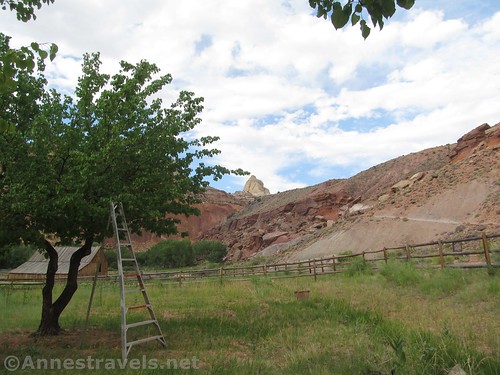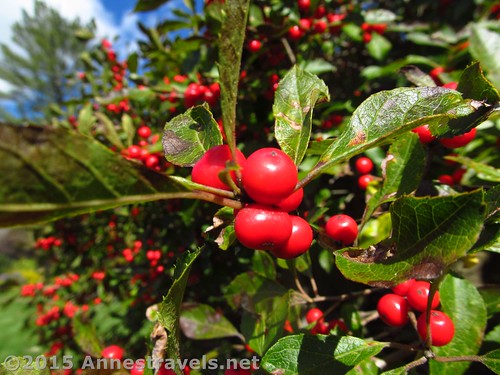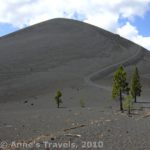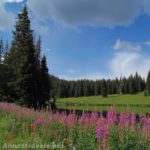
Road up to the Bristlecone Pine Forest in Great Basin National Park, Nevada
The last few weeks we’ve enjoyed fall at its finest. The leaves on the trees have been changing color and slowly falling to the ground, the sun has shined brightly illuminating the leaves. The weather has been warm enough to enjoy being outside. So many days, I thought, “It’s too nice to not be outside!”

Fall colors along the Hojack Trail in Webster, New York
One of the things we enjoy doing every fall is going and picking apples, then turning said apples into applesauce, apple pie, apple muffins, and all other kinds of apple delights. Most of the apples we pick are truly organic – they grow wild – so the proof of a good tree to pick apples from is found in tasting the apples. Sometimes trees produce apples are tiny and sour, but others, year after year, produce apples that are delicious.

The orchard at Fruita in Capitol Reef National Park, Utah
Jesus told His disciples, “Every good tree bears good fruit, but a bad tree bears bad fruit. A good tree cannot bear bad fruit, nor can a bad tree bear good fruit… Therefore by their fruits you will know them.” (Matthew 7:17-18; 20) We know the good apple trees because they produce good apples.

Berries in the Willowwood Arboretum, New Jersey
Sometimes it’s hard to tell exactly what variety of tree we see. We’ll be out walking in the spring and see a tree in bloom. We know it’s a fruit tree, but even looking at the bark and blossoms doesn’t always tell us what type of fruit it will give. (Especially those of us who aren’t well-versed in tree identification!) Sometimes we have to wait until summer to see if the tree is producing cherries or crabapples, pears or plums.

Picking apricots in Fruita, Utah
Most of the people around us claim to be something. They identify themselves by their profession – an engineer or a doctor or a carpenter, etc. – or by their hobbies – for example, fishing enthusiast or football fan or gamer – or by something that makes them unique – such as the fact that they help out at a food pantry or they have what it takes to be a politician. Some flaunt their identity, constantly talking about it, wearing t-shirts that identify them, always trying to get others to be like them.

Interpreter at Cooper Mill, Chester, New Jersey
But it’s by their fruit that you’ll know them for who they are. I have a friend who identifies himself as a coffee drinker who can’t live without his coffee and lots of it. But since I know him, I know he only drinks one or two cups of coffee a day and that in the morning. It’s a passion in words, but not in reality. We’ve all seen people who talk about how much they care – about missions, about starving people, so on and so forth. And we’ve all seen people who actually do something to help the people they claim they passionately care about. But we’ve also seen people who talk the talk, but don’t walk the walk.

Walking the walk can make your feet rather dusty… Nampaweap Petroglyph Site, Arizona
It can be helpful to us to look closely at ourselves, first, and see if we are producing the fruit we claim we are producing. Do we say we are amazing hikers and then never walk further than our driveway, year in, year out? Are we claiming to be passionate about a topic but never get beyond the talking stage? How we identify ourselves can change over time – for example, I never identified myself as a kayaker until I had a kayak to paddle.
Without judgement, it can be helpful at times to look at others and see if they are producing fruit in keeping with their identifying claims. For example, there is a ministry I get emails from who claims to be passionate about seeing people supernaturally healed by the power of God, like Jesus did in the Bible. And they do more than talk – I’ve personally witnessed what this ministry does, both in the US and across the globe. I’ve also followed organizations on social media, feeling that they supported a good cause, only to find that they do little more than talk about how much needs to be done.

Hiking the slopes of Mt. Agassiz, Uinta Mountains, Utah
When people don’t produce fruit in line with their identification, it’s sort of like a tree the store told you was an apple tree that starts producing pears. It’s not necessarily bad – pears still taste good – but it’s still a false identification.

Side canyons of the Grand Canyon from the Ken Patrick Trail, Arizona
We must, first, be willing to be who we claim we are, and to produce fruit in keeping with that (remember that ultimately comes from God, so it’s not just our efforts that will bring forth fruit). Second, we must be willing to look at the fruit from people we wish to identify with and follow. If their fruit isn’t what they claim, it may be beneficial for us to distance ourselves from their cause – or at the very least, to walk it out instead of just being drawn into the talk without the walk, or the identification without the fruit.








Pingback: The Fruit of the Spirit in the Wilderness - Anne's Travels